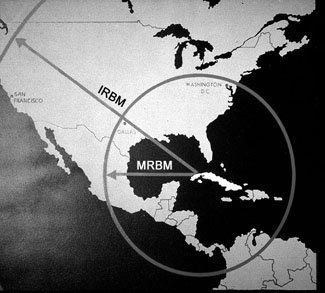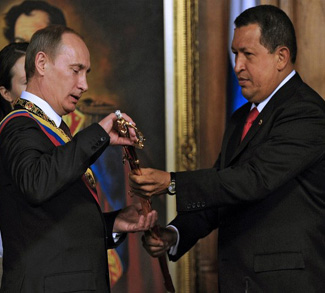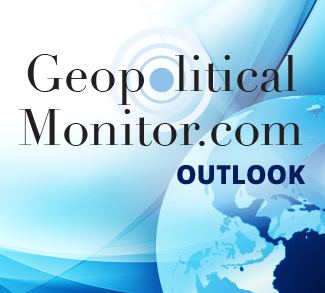FORECAST
Yesterday, in a special referendum, Venezuelan voters overturned constitutionally mandated term-limits, allowing Venezuelan president Hugo Chavez and his allies unlimited rights to hold public office. Thus, Venezuela’s path towards a revolution-cum-dictatorship appears inevitable.
With a 67% turnout in eligible voters, 54% voted to end term-limits, with 94% of polling stations reporting thus far. Opposition party leaders have accepted the results, meaning first, that the referendum appears free and fair for the most part, and second, that the repeal of five constitutional articles imposing term-limits is de facto law in Venezuela, as of Sunday.
Now, instead of his tenure ending next year, as under the constitution, he is legally allowed to continue to run in perpetuity: in fact, Chavez has said he might retain power until 2049, at the ripe age of 95. Term-limits are also overturned not just for the president, but for governors, legislators, mayors, and even local councilors.
Chavez has called the results a mandate for socialism, no doubt providing the indefatigable and charismatic leader even more clout to follow his leftist agenda. Under Chavez, Venezuela has emerged as one of the world’s foremost leftist nations – his governments programs aimed at supporting and providing healthcare, education, job and subsidies to the poor have garnered him enormous popularity at home.
However, it is Chavez’s foreign policy that has international observers concerned. Chavez has been a staunch proponent of a Latin-American agenda, irking Washington as a direct challenge to its Monroe Doctrine. He has not only supported Cuba, America’s worst enemy in the hemisphere, but emerging leftist powers such as Bolivia.
Further, Chavez has not restrained Venezuelan influence to the western hemisphere. As part of OPEC, Chavez has joined Iran in trying to use petro-dollars to combat American global hegemony. Venezuela was also one of only a handful of countries to directly denounce Israel, banishing Israeli embassy officials and cutting off diplomatic ties to Israel in symbolic response to Israel’s alleged war crimes and crimes against humanity during their three-week Gaza offensive.
Despite vehemently opposing the Bush Doctrine, Chavez has much to thank the former American president. After Bush preemptively invaded Iraq in 2003, oil prices around the world skyrocketed and Venezuela was able to almost double its GDP and slash its unemployment rate by about 20%. Awash in oil money, Venezuela has emerged as a major international player during the Bush years.
Perhaps that is why various alleged covert attempts by the CIA to overthrow Chavez have been reported by the Venezuelan government, first attempted by Bush in 2002 (which temporarily succeeded and was even officially acknowledged by a later embarrassed U.S. State Department) and last attempted apparently just days before yesterday’s referendum.
[If the last alleged coup attempt was a bona fide CIA covert-op, it remains to be seen whether it was ordered by Obama during his first month in office, or whether rogue CIA operatives carried forth on orders received previously from Bush, without first seeking confirmation from the new administration.]
Nonetheless, the U.S. may not need to seek an active ouster of Chavez despite an end to his term-limits. With world oil prices plummeting, Chavez will be unable to deliver on his ambitious promises, and a populist politician that cannot deliver will surely fall in the next election, ousted by a dissatisfied citizenry.
Until then, Venezuela’s path towards a revolution-cum-dictatorship appears inevitable.
Ironically, Chavez’s first call of congratulations came from Cuba’s ailing 82-year old iconic leader, Fidel Castro.
After failing to overthrow the Venezuelan government in an attempted military coup d’etat in 1992, Hugo Chavez, a lieutenant colonel, turned to politics, eventually winning the presidency in the 1998 election. In 1999, Chavez pushed through a new constitution, and, since then, has called for a number of referendums seeking popular support for his reformist left-wing agenda.
His most recent attempt in December 2007 failed, and a comprehensive reform package that would have institutionalized Chavez’ leftist revolution was defeated. Undaunted, the populist leader let the people decide on the term-limits Sunday – and won.
SUMMARY OF EVENTS: February 9 – 16, 2009
WORLD
Cash-rich mafia groups have been channelling funds into banks desperate to survive the global credit crisis, the U.N. anti-crime chief said on Monday.
An official in the British government claims that reports made by the International Monetary Fund are being distorted due to pressure tactics by the world’s big powers.
NORTH AMERICA
Canada
An Ontario Superior Court ruling could open the door to police routinely using Internet Protocol addresses to find out the names of people online, without any need for a search warrant.
United States
Some liberals are beginning to suspect Bush loyalists in career government positions are doing their best to try to deflate and hinder President Obama’s agenda.
Texas officials are working on a plan to respond to a potential collapse of the Mexican government and the specter of thousands fleeing north in fear for their lives after recent reports indicated the country could be on the verge of chaos.
The U.S. military stepped up its monitoring of North Korea this week amid concerns about a possible missile launch by Pyongyang, a U.S. military official said on Tuesday.
More than one-third of all weapons the United States has procured for Afghanistan’s government are missing, according to a government report released Thursday.
Three major human rights organizations have declared the Department of Defense was running secret prisons at Bagram and in Iraq, actively sought ways around the terms of the Geneva conventions, and cooperated with the CIA’s “ghost detention” program which saw prisoners hidden from Red Cross oversight.
SOUTH AMERICA
Venezuela
Venezuelan President Hugo Chavez reported Wednesday an attempted coup against his palace by army troops in contact with “a soldier on the run in the United States,” but said the government had everything under control.
Venezuela’s opposition accused President Hugo Chavez on Friday of spending government money and clamping down on protests in the campaign to extend his rule for at least another decade.
EASTERN EUROPE
Georgia
The breakaway Georgian region of South Ossetia alleged on Monday that two unexploded Georgian shells landed in its capital Tskhinvali, but Tbilisi dismissed the claim as nonsense.
Two European ceasefire monitors were detained by militiamen from Georgia’s rebel South Ossetia region Tuesday, highlighting continued tensions six months after the war between Russia and Georgia.
MIDDLE EAST
UN Secretary-general Ban Ki-moon has informed the Security Council of his intention to establish a commission to look into Israel’s bombing of UN facilities in Gaza, the Council’s president said on Monday.
Iran
Iran denied on Wednesday that a ship being detained by Cypriot authorities reportedly by request of the United States and Israel was carrying weapons to the Hamas-ruled Gaza Strip.
EAST ASIA
North Korea
North Korea has apparently started assembling its longest-range missile, which could be ready for launch late this month, a South Korean newspaper said Friday.
CENTRAL ASIA
Kazakhstan
Russia will supply Kazakhstan with S-300 air defense systems in the near future, the Kazakh defense minister said on Thursday.
Kyrgyzstan
Kyrgyzstan’s president accused the United States Wednesday of refusing to heed repeated calls to pay more rent for its air base in his country but did not say if he would welcome a fresh U.S. offer.
SOUTH ASIA
Pakistan
Islamabad on Thursday admitted for the first time that the Mumbai attacks, which killed 165 people, were planned partly in Pakistan and filed a case against eight suspects, six of them in custody.
Sri Lanka
Sri Lanka’s top defence official has accused international media and aid organisations of siding with the Tamil Tigers, a report said Saturday, as the military pushed its offensive against the rebels.
Sixteen patients at a makeshift hospital in Sri Lanka’s war zone were killed when the facility was shelled, the Red Cross said Tuesday, as Colombo accused Tamil rebels of gunning down 19 civilians.
Sri Lanka’s military on Wednesday denied shelling a makeshift hospital where 16 patients were killed as concern mounted for the safety of non-combatants trapped in the island’s ethnic conflict.
Sri Lanka was accused Wednesday of planning concentration camps to hold 200,000 ethnic Tamil refugees from its northeastern conflict zone for up to three years — and seeking funding for the project from Britain.
Thailand
Thai Prime Minister Abhisit Vejjajiva has admitted that the kingdom’s authorities towed boat people from Myanmar out to sea, following weeks of allegations of cruelty against the migrants.
AFRICA
Madagascar
Madagascar’s defence minister on Monday announced her resignation in protest at the police shooting of opposition supporters this weekend that left 28 dead and drew international condemnation.
Zimbabwe
Zimbabwean police charged a senior MDC official with treason on Friday, just hours after a unity cabinet comprising the opposition party and President Robert Mugabe’s ZANU-PF was sworn in, the MDC said.
Manjit Singh is a contributor to Geopoliticalmonitor.com



